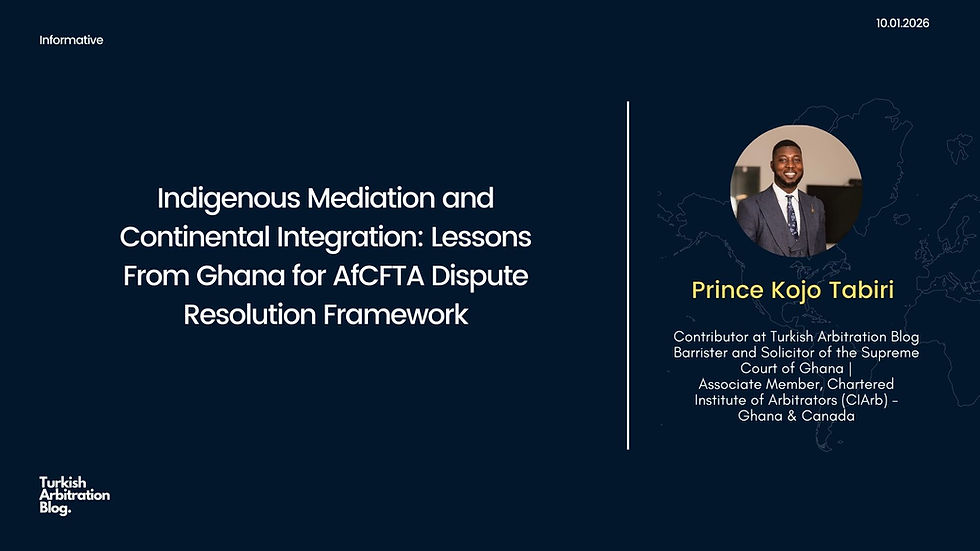Arbitration and the Role of Immunity in Investor-State Disputes
- arbitrationblog
- Jun 25, 2025
- 6 min read

1. Introduction: Paradox of Sovereign Immunity
Traditionally, private investors did not have access to international methods of dispute settlement. The classical method for the international settlement of investment disputes was diplomatic protection by the Investor’s home State. But diplomatic protection was largely unsatisfactory. The investor must have exhausted all local remedies in the host State. The investor depended entirely on its national government which may be unwilling to pursue the claim for political reasons.[1]This is how the need for Investor-State Arbitration emerged. The role of State immunity in Investor-State Disputes is a subject that has come into fashion, and in law, fashion is just as important as in other fields. [2]At the heart of investor-State arbitration lies a unique paradox: while international arbitration is designed to hold States responsible through neutral, binding dispute resolution mechanisms, those very States tend to invoke sovereign immunity as a procedural shield against such responsibility. This article explores the evolving role of State immunity in Investor-State disputes.
2. Concept and the Role of State Immunity
According to the case of Germany v. Italy: Greece intervening [3], the principle of State immunity defined as a pillar of present-day substantive international law. It is an expression of non-interference and respect for the sovereignty of other States[4]. This pillar derives from the principle of sovereign equality of States (par in parem non habet imperium), as enshrined in Article 2, paragraph 1, of the Charter of the United Nations, a principle that has for centuries been deeply rooted in customary international law. Central to the principle of State immunity is that of jurisdictional immunity which, of course, debars private parties from bringing suits before the courts of a forum State against another State for its acts iure imperii. Acts iure imperii are sovereign, public, non-commercial or governmental acts of State. States can enjoy its immunity only with regard to such acts. But in respect of non-sovereign, private, non-governmental, commercial acts (acta jure gestionis), States cannot attract immunity [5]. The ‘private person’ test is the most important criterion for the determination of act jure imperii and acts iure gestionis [6].
The main criterias in deciding whether a particular act is a commercial activity or actum iure imperii are the character or nature of the act and the purpose of that act. Because if the nature alone is to be considered, then if an act can also be engaged in by a private individual, it must be a commercial act, whatever the motive of the State in entering into the act, and whatever purpose or objective that that act serves. On the other hand, if the purpose of the act alone is to be considered, this means that a particular act, even though it can also be performed by a private individual, can still be regarded as a sovereign or public act if it serves a sovereign or public purpose [7]. Drawing distinction between acts of a foreign sovereign nature (acta iure imperii) and acts of a commercial nature (acts iure gestionis) is due to the increasing involvement of states in World Trade activities. This approach towards State Immunity is called restrictive doctrine. Another approach is the doctrine of absolute immunity. Under this doctrine, any proceeding against foreign States are inadmissible unless the State expressly agrees to waive Immunity. This simply means that no sovereign State could be brought to justice in the court of another without its consent.
States based on this rule should enjoy absolute immunity in all their acts, be they public or private. Absolute Immunity thus refers to the privileges and exemptions, granted by one state through its judicial machinery to another, against whom it is sought to entertain proceedings, attachments of property or the execution of judgements. However, when Immunity becomes absolute, justice becomes impossible. That's why many states began to give their support for the restrictive Immunity approach and in fact started adopting the restrictive approach to Immunity at an early stage [8]. The Supreme Court of Austria in 1950 concluded: [9] “Classic doctrine of Immunity arose at a time, when all commercial activities of State in foreign countries were connected with their political activities... Whereas today States engage in commercial activities and... enter most competitions with their own nationals and with foreigners. Consequently, the classic doctrine has lost its meaning and ratione cessante, can no longer be recognized as a rule of international law. Therefore, it should be replaced by a doctrine restricting the Immunity of States. ”
As before mentioned, the waiver of immunity by State is possible. There are two types of waivers: explicit and implied. The easiest and most efficient way of dealing with state immunity is to seek an express waiver, namely to draft waiver of immunity clauses [10]. According to Article 7 of United Nations’ Convention on Jurisdictional Immunities of States and Their Property, a State cannot invoke immunity from jurisdiction in a proceeding before a court of another State with regard to a matter or case if it has expressly consented to the exercise of jurisdiction by the court with regard to the matter or case:
(a) by international agreement;
(b) in a written contract; or
(c) by a declaration before the court or by a written communication in a specific proceeding.
According to Part 2 of Article 7, agreement by a State for the application of the law of another State shall not be interpreted as consent to the exercise of jurisdiction by the courts of that other State. On the contrary, in the case of Eckert International, Incorporated, Plaintiff appellee, v. the Government of the Sovereign Democratic Republic of Fiji, if a foreign state has agreed that a contract is governed by the law of another foreign country, it should be considered as an implied waiver. In the case of Hirsh v. State of Israel, it is noted that an implied waiver can be found where a foreign state files a responsive pleading that fails to raise the defense of sovereign immunity. According to Article 17 of United Nations’ Convention on Jurisdictional Immunities of States and Their Property, If a State enters into an agreement in writing with a foreign natural or juridical person to submit to arbitration differences relating to a commercial transaction, that State cannot invoke immunity from jurisdiction before a court of another State which is otherwise competent in a proceeding which relates to:
(a) the validity, interpretation or application of the arbitration agreement;
(b) the arbitration procedure; or
(c) the confirmation or the setting aside of the award, unless the arbitration agreement
otherwise provides.
Despite the fact that this convention has been referred to in several cases, it has not entered into force, because it needs 30 ratification, acceptance, approval or accession, but hasn't reached this number yet. The position in Article 17 is also supported by other legal authorities. In Yearbook of the International Law Commission (1985), it is stated:
“An arbitration agreement necessarily entailed a waiver of jurisdictional immunity with respect to the arbitral tribunal and also with respect to a domestic court for any action relating to arbitration.” Regarding State Immunity, the Tribunal de grande instance of Paris in the Socialist Federal Republic of Yugoslavia v. Societe europeenne d'etudes et d'entreprises decided: “By the very fact of becoming a party to an arbitration clause the Yugoslav State agreed to waive its immunity from jurisdiction with regard to arbitrators and their award up to and including the procedure for granting an exequatur which was necessary for the award to acquire full force;
Waiver of jurisdictional immunity does not in any way involve waiver of immunity from execution. The order granting an exequatur for the disputed arbitral award does not, however, constitute a measure of execution but simply a preliminary measure taken prior to measures of execution.” It becomes clear that waiver of jurisdictional immunity does not necessarily mean the waiver of the execution immunity. In discussing the two distinct forms of immunity, “jurisdictional immunity” (“immunity from suit”, “immunity from adjudication”, “immunity from adjudicative process”) is used to denote the exemption from the power of a foreign court or a tribunal to hear and adjuge a case; and “immunity from enforcement/execution” is used, in place of longer and more precise term “immunity from measures of constraint”, to signify the exemption from the enforcement of court orders and actual execution of judgements and arbitral awards [11].
3. Conclusion: Tension between Investor Protection and State Immunity While sovereign immunity protects essential state functions and reflects international comity, its application—particularly in the enforcement of arbitral awards—can effectively deprive investors of justice. So which one is prevailing, provision of sovereign immunity or restoration of investor’s rights? Domestic enforcement proceedings are now shaping the future of investment arbitration, as these proceedings have become a “second round” for states that refuse to comply with investment awards by using an excuse of “enforcement immunity” after passing a “first round”, namely making efforts for using jurisdictional immunity [12]. Unfortunately, there is a lack of uniformity across the globe, since different decisions of courts exist regarding this issue.
List of Literature:
[1] Schreuer, Christoph. The ICSID Convention: A Commentary, Cambridge University Press, 2009, page 6.
[2] The Role of the State in Investor-State Arbitration edited by Lalani and Palonca Lazo, page 1, introductory remarks.
[4] Roman Nowosielski, STATE IMMUNITY AND THE RIGHT OF ACCESS TO COURT. THE NATONIEWSKI CASE BEFORE THE POLISH COURTS, page 265.
[5]Xiaodong Yang, State immunity in International Law, Cambridge University Press, page
58.
[6] ibid, page 41.
[7] ibid, page 129.
[8] Paschal Oguno, The concept of state immunity under international law: An overview.
International Journal of Law, Volume 2; Issue 5; September 2016; Page No. 15.
[9] Dralle V. Republic of Czechslovakia (1950) 17 international law report (ILR) p.155
[10] Reference 8.
[11] Reference 5, page 345.




Comments